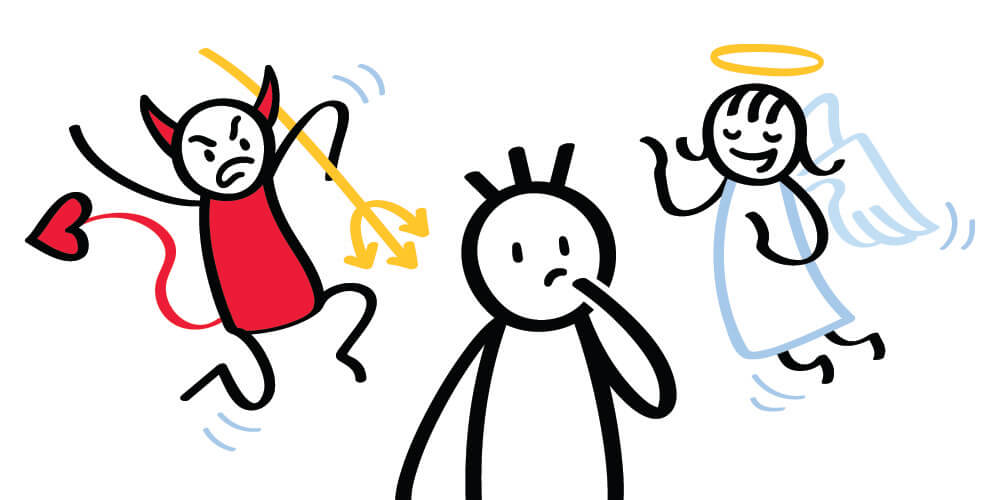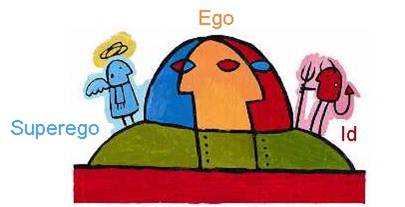

Whatever the anxiety, the ego seeks to reduce it. Moral anxiety is a function of the development of the superego. In psychoanalysis, the superego is the part of a persons mind that helps keep the id in check, guiding the person to follow learned rules rather than.

There is a fear of self-punishment (e.g., guilt) for acting contrary to one's values. Moral anxiety is based on a feeling that one's internalized values are about to be compromised. There is a fear of external punishment for such expression. Neurotic anxiety results from the ego feeling overwhelmed by the id, which threatens to express its irrationality in thoughts and behavior. The other two types are derived from objective anxiety. It is especially the ego ideal portion of the superego that undergoes modification. Hence, the superego provides an internalized ‘parent,’ experienced as oneself, that is a source of guilt and shame, as well as a source of self-esteem. Objective anxiety results from a real threat in the physical world to one's well-being, as when a ferocious-looking dog appears from around the corner. The ego ideal portion of the superego is composed of parental aspirations: what one should feel, be, or do. Sigmund Freud (1856-1939) considered three types.


Now that’s what we called applied science.Psychology History Timeline Anxiety (Freud) Definition:Īccording to Freud, a feeling of impending danger that can be based on objective, neurotic, or moral threats.Īnxiety is a feeling of impending danger.
#Superego definition psychology software#
Even if you don’t follow Freud, the ‘id’ in id Software is still a vivid thought – a pure thrill promised in their name, from the unchecked speed of the DOOM Slayer to the bloody indulgence of its rip-and-tear combat. PRIMITIVE SUPEREGO: 'Primitive superego is found in object relations theory. These three components, to those who prescribe to Freud’s teachings, help define the psyche and actions carried out by the human consciousness. A concept first presented by British psychoanalyst James Strachey, this theory identifies primitive superego as an early form of superego that is the result of the exposure to particularly harsh or terrifying objects. Meanwhile, the ego acts as sort of a mediating force between the id and super-ego, finding ways to satisfy the id’s wants and needs while satisfying the super-ego’s desire to not make a total ass of oneself or settle with a low-calorie sparkling water or something. The ego is the area that mediates between reality and the primitive impulses of the id. Unlike the id, the super-ego is concerned with concepts like morality, ethics, social faux pas and that perhaps consuming ungodly amounts of neon-colored corn syrup in such a short period of time isn’t a good idea in the long run. u ego: restrains instinctual energy in order to maintain the safety of the individual and to help the person to be a member of society. Meanwhile, the super-ego is often treated as the critical portion of the psyche. Putting it super-simply, the id is driven solely by the basic needs and wants in life and damn the consequences – much like my wanting a third Mountain Dew today regardless of what the doctor’s been saying about my sugar intake. The ‘id’ in the Freudian model refers to the part of the human psyche that’s committed to impulse and instinct. The superego develops last, and is based on morals and judgments about right and wrong. Now, the topic of the Freudian school of psychoanalysis in the science community is, uh…complicated, so in the interest of the fact that we’re a video game website (and also I think I got a ‘C’ in that class?), treat this primer more as fun DOOM trivia and notan academic resource on psychiatry. The superego works to suppress the urges of the id and tries to make the ego behave morally, rather than realistically. The id is believed by Freud to comprise one of three key aspects of the human psyche in conjunction with two other concepts – the ego and super-ego. According to Sigmund Freud's psychoanalytic theory of personality, the superego is the component of personality composed of the internalized ideals that we have acquired from our parents and society. Inspiring the namesake of the DOOM series’ developer for its ties to pure instinct, the concept of the ‘id’ was primarily defined by Sigmund Freud’s work in the field of psychoanalysis. How? By pulling out some old notes I took in my beginner’s level college psychology course! What exactly is the ‘id’? By now we’ve all seen (and definitely heard) the awesome id Software video intro countless times before playing DOOM (2016), but have you ever thought about the meaning of that two-letter word in the name? Today, I thought I’d do something different and explain what the ‘id’ is.


 0 kommentar(er)
0 kommentar(er)
